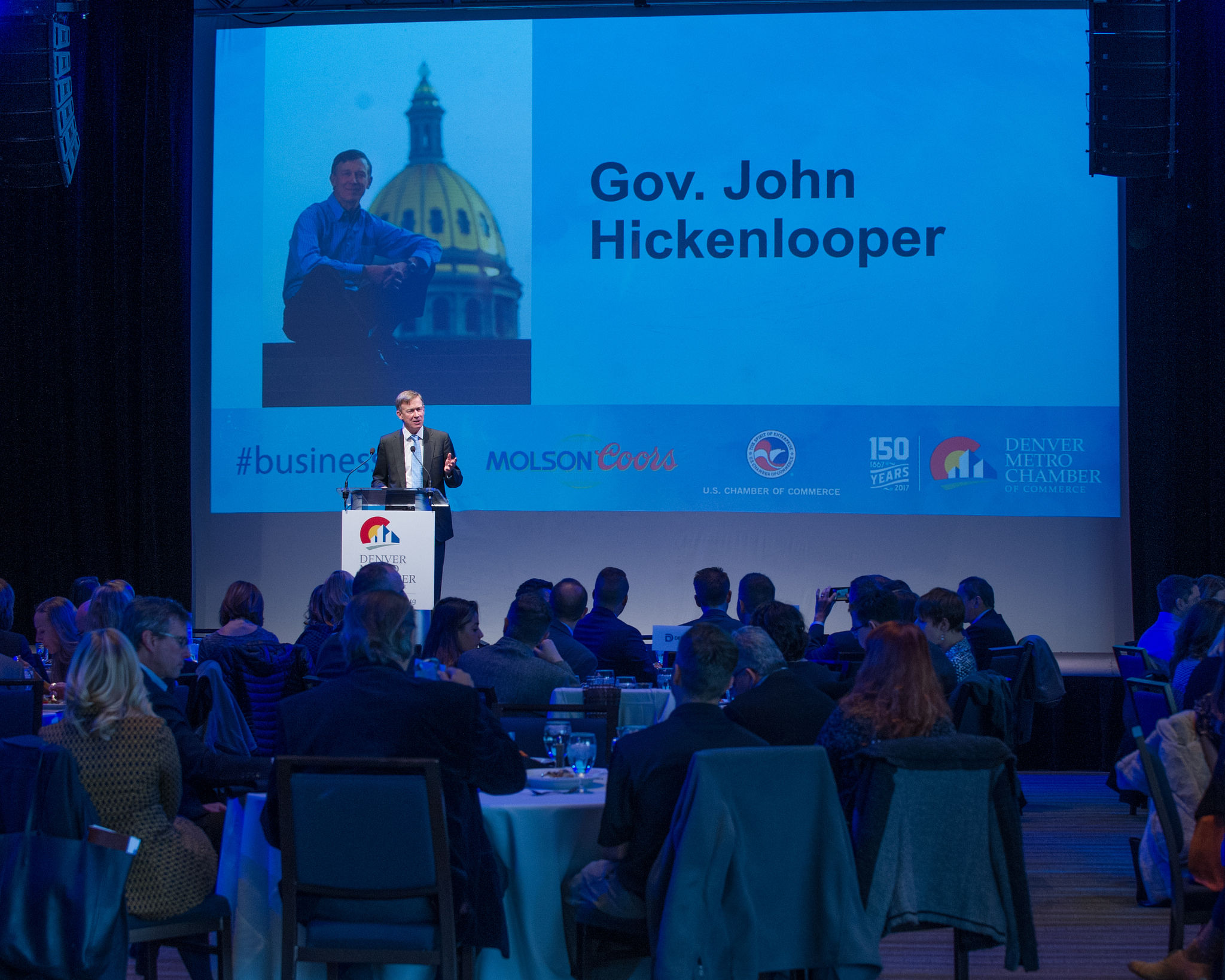
Colorado can be on the leading edge of water innovation, but it’s going to take collaboration, entrepreneurship and investment. That was the call from the governor and leaders in water at the Denver Metro Chamber of Commerce’s Business H2O this afternoon.
“We can’t do this alone, but we can help convene and help facilitate,” Gov. John Hickenlooper told the audience of 200 business and civic leaders today – reflecting two years after the approval of the state’s first water plan. “We need entrepreneurs, we need the innovators, we need business, we need capital and we need will.”
He highlighted the need for more funding to put the Colorado Water Plan into action, to speed up time bringing innovation to market and to focus on water as a renewable energy source, suggesting that Coloradans address this challenge with a start-up frame of mind: “We need to be able to learn from our mistakes rapidly, we need to tweak our systems to make changes and adjustments in real time so that we are constantly improving.”
Climate and growth create challenges
The governor and business leaders pointed out the ongoing challenges to address our projected water shortfall, which could be over 500,000 acre-feet by 2050 – or water for about 2.5 million Coloradans each year.
Meanwhile, Colorado continues to grow: “We know how we grow in the next 50 years has to be different than how we grew in the last 50 years,” said Chamber President and CEO Kelly Brough. “That’s not just an imperative around water; it’s an imperative around transportation and air quality. It’s critical.”
Couple that with climate change, which impacts where snow falls and how long before it starts to melt and move downstream, and the challenge mounts. It means using strategies beyond conserving water, Brough said.
“This isn’t a question of just conservation … we must store water and store it differently than we have, we must be more efficient with water and we must have reuse strategies,” Brough said. “Technology is fundamental to the success we will have going forward as we find solutions to help our water go further.”
Local, national and international leaders shared innovations in water, and they highlighted keys for success in addressing their own water use.
Change the culture.
When Molson Coors began evaluating its water usage, they found they were using more than four barrels of water for every barrel of beer they produce. They started with their team – and they weren’t making much headway until they focused on the culture at their brewhouses and empowered their teams: “When the culture changed, we saw immediate change,” said Kim Marotta, global senior director of corporate responsibility for Molson Coors.
Today, they’ve cut more than half to one and half barrels of water from their brewing process, with the goal of using 2.8 barrels of water for every barrel of beer they brew. From there, they looked at their partners and their suppliers, and took an active collaborative role with them. Instead of waiting for someone else to fix the issue, they wanted to be involved in the solution, Marotta said.
“For too long people sat on the sidelines … It’s time for that to change,” she added. “If we’re really going to look at creating a solution and ensure that we have long-term availability of water it’s going to take all of us working together.
Multiply small wins.
While hydropower can be an effective renewable energy solution, the cost, time to build and disruption to the environment can be problematic, said Emrgy CEO Emily Morris. Her start-up focuses on delivering hydropower wherever water flows – and she’s piloting that solution along the South Boulder Canal with Denver Water.
Turbines placed along the nine-mile canal will generate 80 megawatts of energy per year – or enough to power seven homes. It took a fraction of the time and investment to install.
“Hydropower can now be delivered in a span of months instead of years,” Morris said. “Any time the water is flowing we’re producing power.”
There are 1.3 billion people who don’t have reliable electricity, Morris said – but 90 percent of them are walking distance to flowing water: “This is really proving a concept that can be replicated.”
Steal good ideas.
Though Colorado faces challenges, Israel has found innovative solutions to increase its water production for years said Joshua Kram, senior director of Middle East Affairs for the U.S. Chamber of Commerce. In fact, Israel reclaims about 90 percent of its water, compared to only 1 percent in the U.S., he said.
“Israel is known as startup nation,” Kram said, adding that water is no different. “For us it’s important to look around the world for best-in-class solutions.”
The time is ripe for Colorado to lead on this issue and partner locally and globally, Hickenlooper said, adding that finding these solutions can’t wait: “No pressure, but the world is counting on us.”








